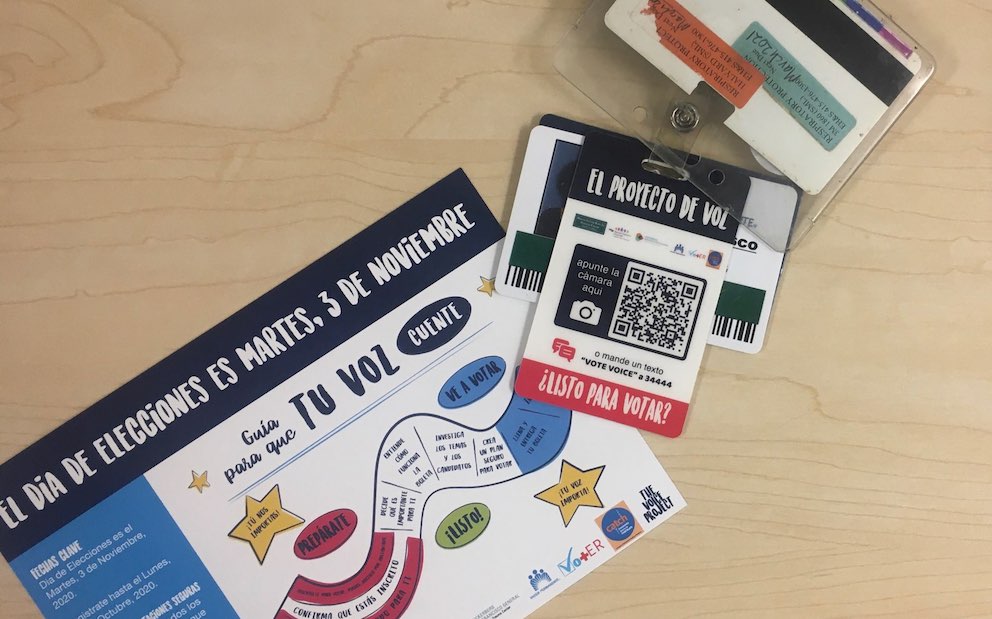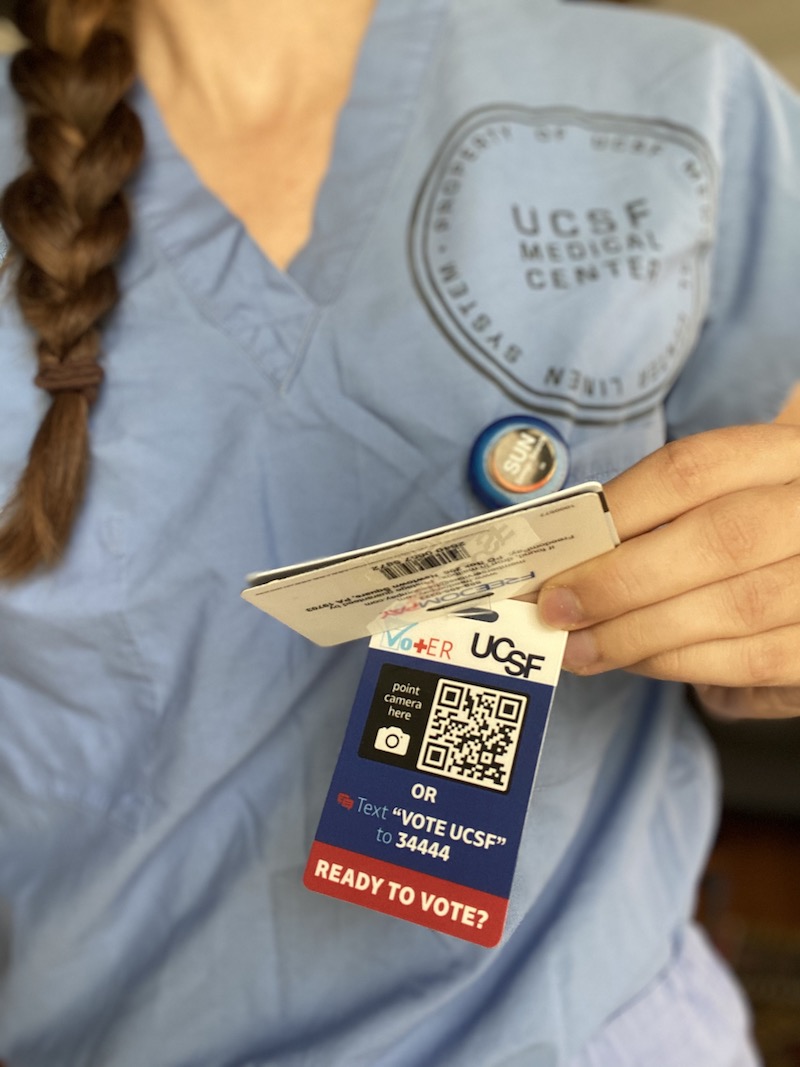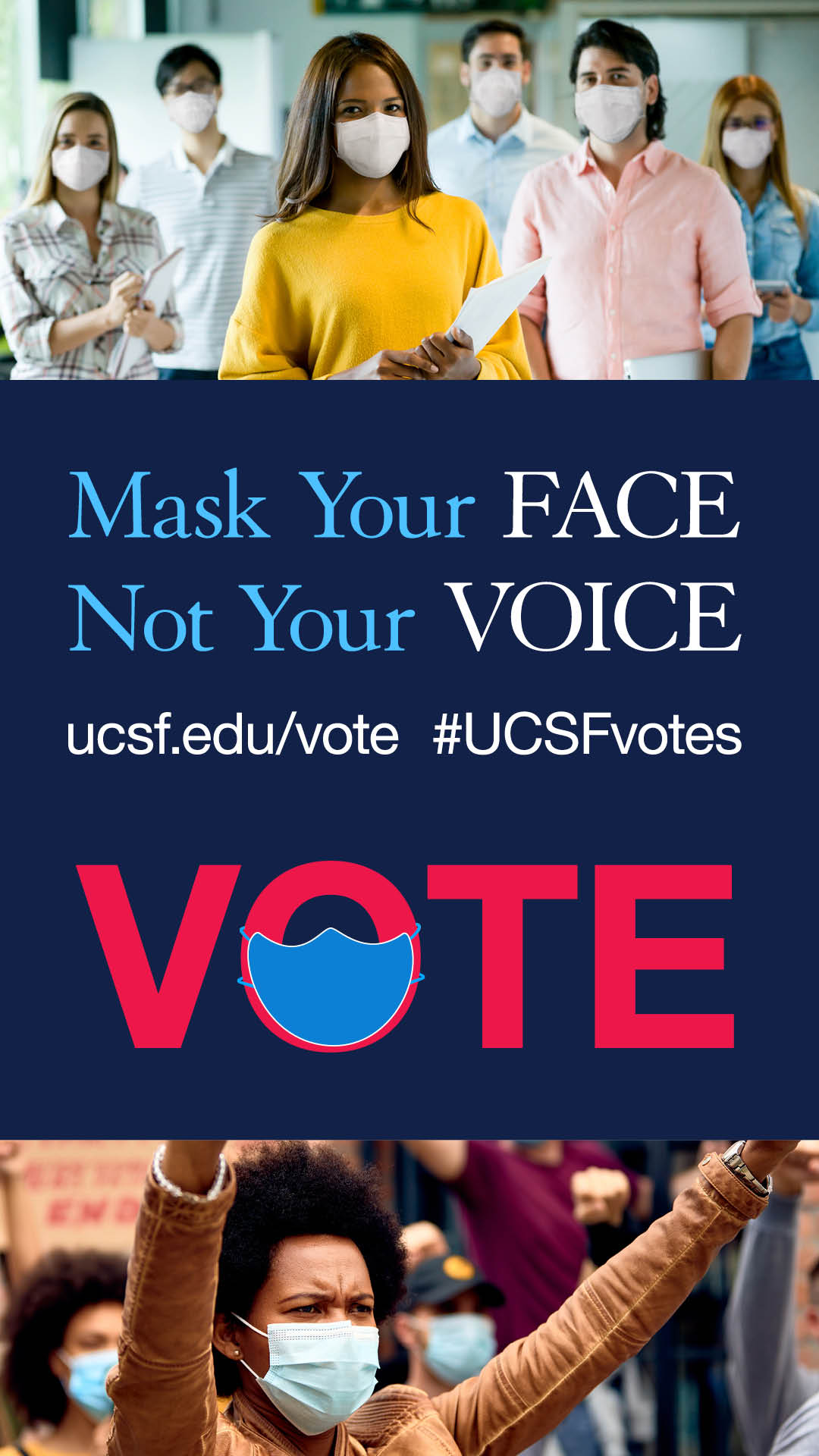UCSF Students, Residents, and Staff Join Forces to Promote the Vote

2020 voter information pictured with UCSF ID badge
UCSF students, residents, and staff are working to promote civic engagement across campus and the health system, as the general election nears on November 3.
For the first time, UCSF Votes, VOICE Project, and VotER have collaborated to promote voter registration efforts this year.
- UCSF Votes is a campus-wide initiative that promotes civic participation across campus and the communities UCSF serves.
- The VOICE Project, born at UCSF Benioff Children’s Hospital Oakland, and now reaching youth and families across UCSF Benioff Children’s Hospitals and Zuckerberg San Francisco General, was created by pediatricians, the nonprofit Martin Luther King Jr. Freedom Center, and young leaders to promote the healthy habit of voting.
- VotER is a national nonpartisan nonprofit that aims to help patients in healthcare settings register to vote and become more civically engaged.
In the midst of the coronavirus pandemic, these three organizations, although initially targeting different populations and occupying different spaces, have taken the opportunity to combine resources to pursue virtual outreach to patients and providers.
“Civic engagement matters all the time,” said Dr. Stephanie Fong Gomez, co-founder of the VOICE project and pediatrics resident. “It’s part of the developmental process. Working together with UCSF Votes and VotER is beneficial because we each have our own strengths.”
"Voter suppression is a reality and leads to significant burdens, especially for our Black and Latinx communities, whom for generations have been fighting for their voices to be heard."
Daniela Brissett
Pediatric Resident & VOICE Project organizer
Some of the combined outreach efforts include: organizing phone and text banking in partnership with the nonpartisan nonprofit Reclaim Our Vote, putting up posters at hospitals and clinics, sending out updated staff-student communication about voter registration, and providing badge backers to direct people to the California department of registrations website and other voter education materials. Additionally, efforts are being made to incorporate questions about civic engagement into the pediatrics psychosocial screen known as the HEADSS assessment and the medical school curriculum. The VOICE Project team has already trained over 300 pediatricians and staff in youth civic engagement and is working with VotER on a national level to teach pediatric providers practical tips to address voting in clinical encounters.
"Voter suppression is a reality and leads to significant burdens, especially for our Black and Latinx communities, whom for generations have been fighting for their voices to be heard,” said Daniela Brissett, UCSF pediatric resident and one of the SF lead organizers of the VOICE project. “We, as healthcare providers, have an important role in supporting non-partisan civic engagement in the same ways we would provide resources for asthma or diabetes.”
 Dr. Madeline Grade, a UCSF emergency medicine resident who helps lead VotER nationally, said she has found it extremely rewarding to see so many healthcare providers motivated about civic health and advocacy. This year, over 22,000 individual providers across the US have ordered free VotER Healthy Democracy Kits (containing a lanyard, badge, and QR code) to help patients check their status or register to vote on their mobile devices. In addition, over 130 hospitals have developed their own site-based initiatives.
Dr. Madeline Grade, a UCSF emergency medicine resident who helps lead VotER nationally, said she has found it extremely rewarding to see so many healthcare providers motivated about civic health and advocacy. This year, over 22,000 individual providers across the US have ordered free VotER Healthy Democracy Kits (containing a lanyard, badge, and QR code) to help patients check their status or register to vote on their mobile devices. In addition, over 130 hospitals have developed their own site-based initiatives.
“There’s been a huge surge in involvement among physicians, nurses, PAs, social workers, and medical students amidst the events of 2020,” said Dr. Grade. “We have a pandemic disproportionately affecting low income and marginalized populations, national demonstrations about racial inequity at unprecedented scale, and ongoing discourse between policymakers and public health officials on how to balance transmission risk and community reopening. Now more than ever, our patients need their voices heard, safely.”
Dr. Grade added that in the UCSF, UCSF Benioff Children’s Hospital, and San Francisco General Hospital Emergency Departments, voter registration information is provided in the discharge paperwork for every patient, and staff members are equipped with badge backers to direct patients to California’s online voter registration portal. After piloting this process in the ED, she is proud that now six other clinical specialties and the School of Medicine have joined this patient-facing initiative.
This year, every registered voter in California will receive an absentee, or mail-in ballot, so it is important that people know where to go to find resources to best inform their vote, said Jennifer Rosko, director of student involvement and programs and co-lead of UCSF Votes efforts.

As such, UCSF Votes has focused their efforts to optimize virtual communication through an online toolkit that offers design graphics like Zoom backgrounds and flyers to promote voter engagement, and a website that allows its visitors to check their voter registration status and view key dates, upcoming events, and other resources.
For Allie Jones, manager of advocacy and communications at UCSF and co-lead of the UCSF Votes effort, the pandemic, immense economic instability, and political and social unrest across the country pose the greatest challenges to voters. Despite these challenges, medical students and residents have been devoted to these efforts for years and see their opportunity to make an impact and engage with patients in a way they have not before.
“The UCSF School of Medicine has trained us to take on a health coaching role during our clinical rotations, and discussing voter registration is a natural extension of that work,” said Meera Garriga, 2nd year medical student and co-team captain for the student side of the UCSF VotER initiative.
As of September 2020, UCSF has helped to register over 300 patients with the VotER initiative.
Dahlia Kaki, 2nd year medical student and co-team captain for the student side of the UCSF VotER initiative, said students from the initiative have pursued RCO status on campus to create a longer-term presence and encourage more student involvement across the professional schools.
The November election is a very unique one, said Garriga. But, what is not unique is that there are many local initiatives on the ballot every election. Students are interested in producing long-term resources to help others learn and understand local races and initiatives in a non-partisan way.
“This takes all of us,” said Dr. Fong Gomez. “The health of our democracy and our communities depends on every citizen.”
Every Californian citizen who is registered to vote will receive their ballot in the mail in early October. Voters can drop off their ballot in a drop box in their county, or at their polling place by 8pm on Election Day, November 3rd. For San Francisco, the designated voting center will be set up in front of the Bill Graham Civic Auditorium on 99 Grove Street, between Polk and Larkin streets.
